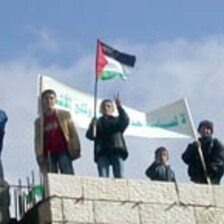The Electronic Intifada 26 December 2003
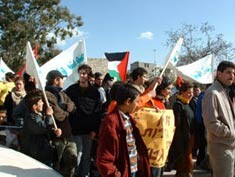

In the early afternoon today, in the middle of a direct, nonviolent action against the Apartheid system of walls and fences in the occupied West Bank, an Israeli citizen was shot in his leg by soldiers of the Israeli army.
Gil Na’amati, whom I hadn’t met until today, was on the front line of Israeli activists who went to the fence to cut it or break it down. I was a few meters behind him, watching the soldiers and helping to take care of the barrier of the road just behind the fence. 20 meters ahead of us were the soldiers, 2 or 3 military jeeps.
The rest of the protesters were 10 meters behind us, including all the Palestinian participants, who were on purpose left behind, knowing that any Palestinian presence in the nonviolent direct action, would end in a violent bloodshed, with the soldiers stopping the action in the most brutal ways there are.
Further behind us, to the east, was the Palestinian village of Mas’Ha - where we all just came from. And further in front, behind the soldiers on the other side of the fence, were the lands of Mas’Ha, and three Israeli settlements that were built upon them, now unofficially annexed to Israel by the Apartheid wall and fence. The location of the action was a perfect example of all that is bad and racist about the separation wall/fence — and now, that spot is also stained with the blood of an innocent young man.
We left Tel Aviv earlier in the morning, in a bus full of Israeli activists. Next to the village of Mas’Ha, we met with many Israeli and international activists, most of them coming directly from the village of Deir Balut, after staying the night in the protest camp being held there for the same reason. With them came several of Deir Balut people, including the village’s mayor, in solidarity with their brothers in Mas’Ha.
After a short gathering, for the planning and coordination of the action, we met in the village center with about 100 Palestinians, and started marching towards the fence. All together, we were maybe close to 200 people.
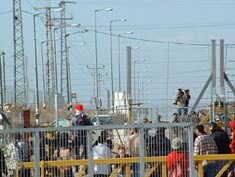
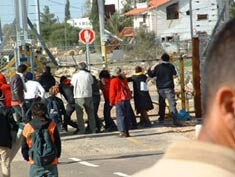
As we reached the fence some of the Israelis and internationals went out front, trying to tear down that symbolic piece of the fence. The soldiers reacted almost immediately by shooting live bullets in the air. There was no use of tear gas, nor even a use of loud speakers to warn of shooting towards us.
None of the soldiers (or anyone else) was threatened, no violence was used by the protesters towards anyone, and the soldiers were clearly aware that there were Israelis there. Shouting and chanting in Hebrew were yelled towards them, including the chant “Refuse! Refuse!”. Just a few minutes later, when the soldiers shot again, I thought it was again just shots in the air. Then I saw one of the protesters being carried back with blood covering his pants and dripping on the road. Another foreign citizen was injured in her leg, less seriously.
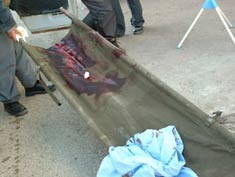
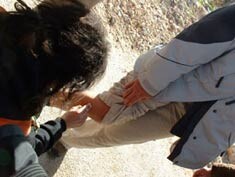
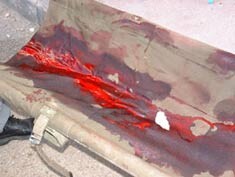
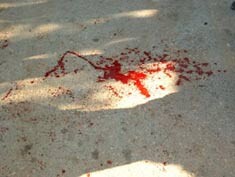
Some of us went backwards. Others went forwards, in spite of the shooting, and with a very effective and short effort, broke a part of the fence, opening the road to Mas’Ha land. Than all the protestors retreated to the village.
We stayed in the village for about an hour more. As we left, we heard reports from the village about military activity inside the village. Of course, the Apartheid system prevents Palestinians from crossing the fences and walls and getting out — but does not prevents soldiers from coming in.
One of the reports was about a curfew declared there in the middle of the day. A group of us had decided to go back to the village, until later in the day or next morning, to make sure the army did not come back to punish the Palestinians for direct action protest by Israelis who want peace. Another group, including friends of Gil, the Israeli who was wounded, had gone to see him in the hospital. And others -0 went back to Deir Balut, where the protest camp is based until next Friday.
Coming home, I have heard in the media several of the lies the military spokesman office had published: that the soldiers had warned us, that they were trying to evacuate us peacefully, that they had used tear gas first, and that the protesters were violent, and that the action was a “riot”.
These are the exact same lies I have heard many times before, whenever the Israeli media publishes anything about the “riots” of Palestinians, or about Palestinians who were killed after “meeting the security forces”. The same system that allows and encourages soldiers to commit crimes against Palestinians — and then denies those crimes and claims they never happened — was apparent in this case too.
Normally, this ”lie and deny” policy is used after a crime towards Palestinians. But this time, after a crime towards an Israeli citizen, who was no threat to anyone in any way, I guess we Israelis can only blame ourselves for not being effective enough struggling against the oppression of the Palestinian people. After so many years of oppressing others, the Israeli regime is now clearly oppressing us too.
I talked a bit with Gil’s friends later on. He is a young man, from a kibbutz in the south of Israel. He was not active before today’s demo, though he always believed in peace and human rights.
From other media reports and from e-mails being passed around, I learned that Gil is still at the hospital and is regarded to be seriously wounded. Also, I know that Yonatan, one of the Israelis who coordinated the action and camp in Deir Balut was arrested later on, after giving a testimony about the shooting. How typical — unarmed protesters were shot at, yet a protester is arrested and not the soldiers who shot or the commander who gave the order.
The struggle against the Apartheid walls and fences goes on, and will probably become bigger, stronger, and more radical. Already tomorrow at noon, Saturday, there will be a big demonstration in the town of Qalqilya, which is completely surrounded by a wall. In the evening there will be a protest in front of the ministry of “security” and army headquarters, in the Kirya in Tel Aviv, against the shooting today. And, of course, the camp in Deir Balut is still on, for another week.
Dan Shohet is a student in Tel Aviv University and a peace activist. The photographs used in this article were provided by the International Women’s Peace Service (IWPS).
